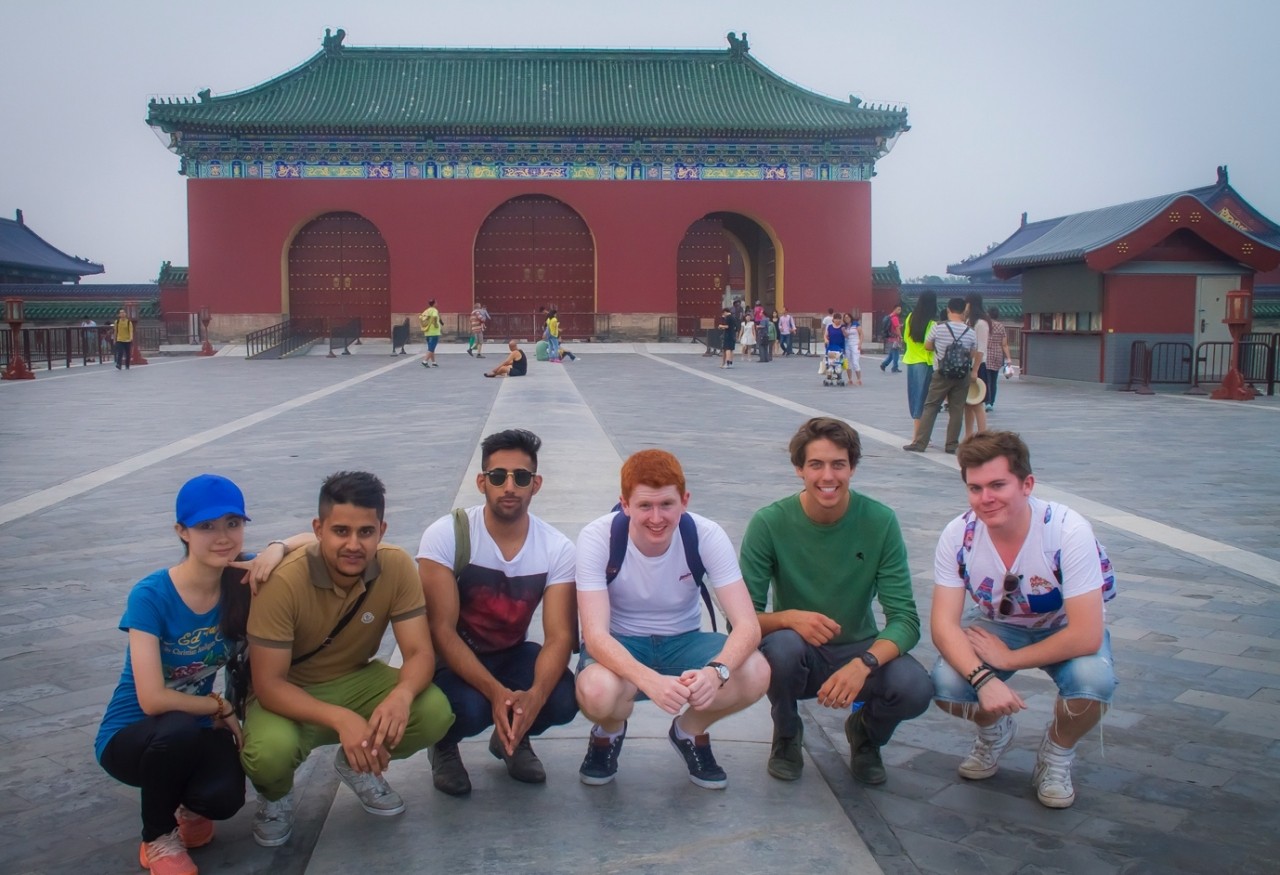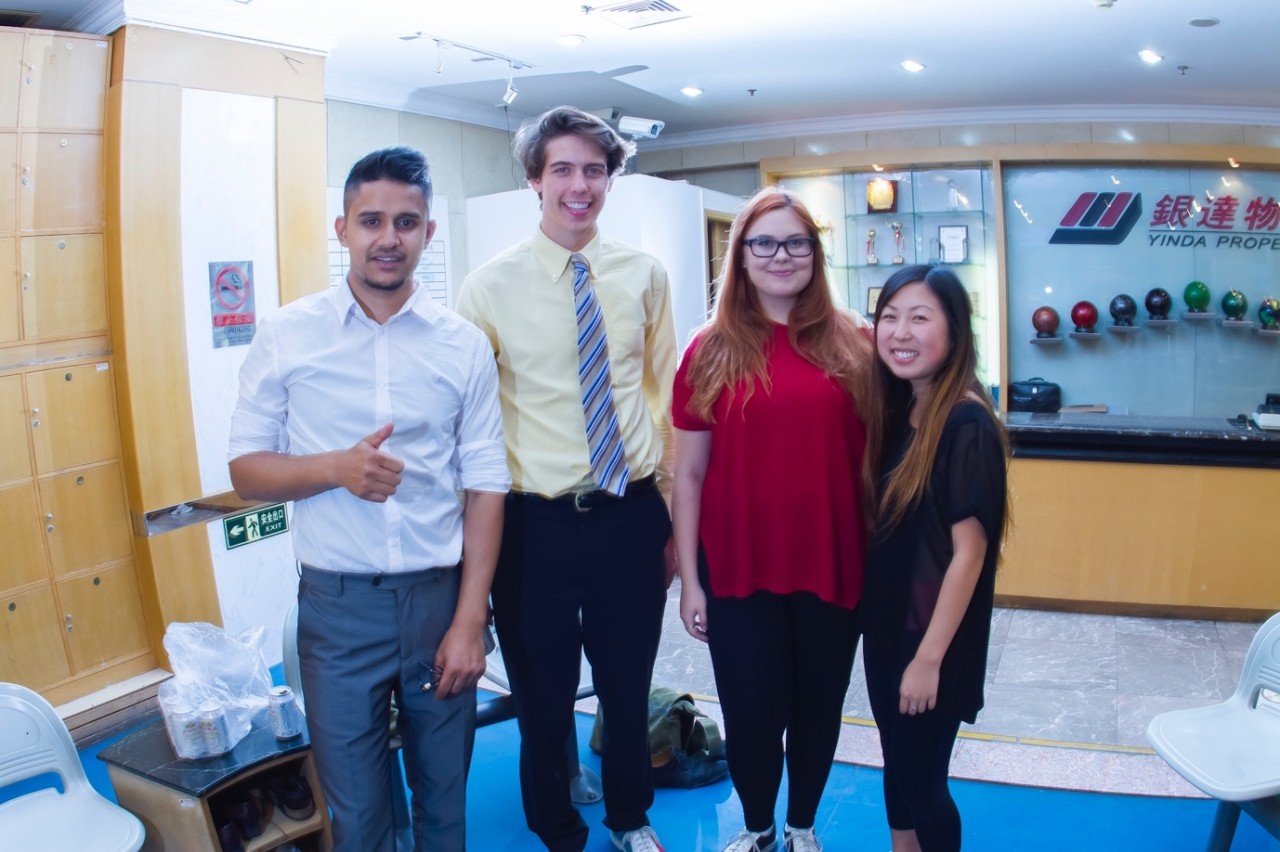Nu pierdeți cele mai bune locuri de muncă!
Abonează-te și săptămânal iți vom trimite un email cu ultimele locuri de muncă disponibile. Introdu adresa ta de email mai jos
I remember the feeling when I first held my bachelor's degree in my hands. There was a ton of relief that there would be no more exams. There was also pride because I had finally achieved something significant. But mixed in with those positive emotions was a sense of panic, as a voice in my head whispered, "What now?"
Transitioning into the world of adulthood meant one thing: landing a job. However, the professional world is highly competitive. Employers expect you to be qualified, multilingual, young, and experienced. Not all of those demands are realistic, of course. But I quickly realized I needed to do something that would help me grow as a person and as a professional before I could chase my dream job.
Then a friend told me about the Career Jet Program organized by Mandarin Cafe and it seemed like the perfect answer to my prayers. They help you find various projects that are related to your professional background in a combination with a well-paid teaching job where you can work on your professional skills and your character. But — and this is a major one — this all happens on the other side of the world, in China!
Relocating to China is a big move, one that requires a ton of planning and research. If you are considering going on a Career Jet Program, know that I've been in your position before, and I ended up doing it. To help you make up your mind, here is my take on all of the good and bad things about doing a Career Jet Program.
The Career Jet Program in a Nutshell
If you're reading this, I guess you have already heard of Mandarin Cafe's the Career Jet Program. But on the off-chance that you haven't, here is a little bit about it that might interest you.
The Career Jet Program is a way for you to spend a year (or in some cases, two) working in China. The program is open to native English speakers with a university degree who are looking for a way to kick-start their careers in an international setting.
Application
Each year, a significant number of applicants from English-speaking countries go through a rigorous selection process. In the end, only the top 100 candidates are chosen to join the program.
Career Jet Takes Care of You
Yes, you read that correctly. Career Jet handles everything for you. First, they find you a job that matches your degree so that you can develop in your chosen field. Moreover, they also secure accommodation for you, as well as health insurance and additional sponsorships. They even help you with the visa application process and your travel expenses.
Working in China
The work you do in China is divided into two. First, you will participate in different projects from your chosen field. The duration and workload of these projects will vary. Second, you will serve as an English language or a subject teacher at a Chinese university, public school or a training center.
The Career Jet Program has a standard duration of one year. A year is plenty of time to pick up new skills, perhaps learn some Mandarin, and forge new connections. However, you can also apply for an extension for another year, if you like it there.
Why China?
Over the last few decades, China has emerged as one of the most attractive work destinations for English-speaking expats.
As the second-largest economy in the world, China is a highly developed country. The biggest cities, such as Beijing and Shanghai, are home to more skyscrapers and shopping malls than many Western cities. However, China is also protective of its cultural heritage, and you can find many traditional buildings, monuments, and UNESCO-protected sites.
Moreover, foreigners can also feel at home in China pretty easily. Most signs are translated into English and Western stores are everywhere. Besides, there are many expats working in China who can lend a helping hand to newcomers as well.
Reasons Why the Career Jet Program Might NOT Be for You
As previously mentioned, working and living in China is a life-transforming experience. By spending just one year there, you can grow both as an expert and as a person. I do not regret going on the Career Jet Program one bit. However, the experience of living in China has some possible setbacks, and not everyone might be up for the challenge.
Many of the difficulties foreigners experience after moving to China have to do with the culture. The people, language, customs, and traditions in China are not the same as those in your home country. To tell you that you would get into the swing of things from day one would be an example of extreme sugar-coating. Plus, you would probably also run into an administrative hiccup or two, and those are not pleasant.
Before you commit to going on a Career Jet Program, please consider these possible disadvantages of life in China. Tackling them early on is better than finding yourself unhappy and alone in a strange country later on.
1. It Gets Lonely
While I was on my flight to China, all I could think about was the excitement that was awaiting me in my new home. However, as soon as I set foot outside the plane, a different emotion hit me. My brain had a "We're not in Kansas anymore" moment that was one part excitement, and nine parts fear.
The anxiety you can feel when you first move to a new country is no joke. In the beginning, I felt like I had no friends, and my family was too far away to help me. I missed everyone and everything from back home. I struggled to order food from any non-Western restaurant. When traveling around the city, I was always just one station away from getting lost in an unfamiliar town.
If you are lucky and adaptable, the initial shock of being in a strange place will quickly dissipate. You'd need help doing something once or twice, but on the third time, you'd already know what to do. I set my mind to it and did my best despite my fears and anxiety, and it worked out for me.
Nevertheless, I cannot promise you that this approach would work for you. If you know you are not good at handling stress, the Career Jet Program might not be for you. If you suffer from depression, I would be especially wary, as major life changes can be too much and prove unhealthy.
2. There Are Many Uncertainties
Indeed, you won't be all alone in China. There will be many people you can turn to for help while you're there (more on that later). It's not Career Jet's first rodeo, so they are prepared for most eventualities.
That being said, people at Mandarin Cafe are not wizards. They don't know precisely what lies in your future, nor do they have a solution to every problem imaginable. If you are struggling with an administrative issue, they will be there for you. If you need a second pair of eyes for a housing or phone contract you find suspicious, you can count on Career Jet's help.
But you cannot come crying at Career Jet's door for every single thing that bothers you. This rule is especially true for interpersonal conflicts. If you don't get along with your neighbours, for example, Career Jet won't be able to do anything for you. You can either use your communication skills to work it out or try to find a new apartment.
I had a similar issue when I was doing my Career Jet Program. My problem was that I felt like my students didn't like me. I think of myself as a likable person, so this made me question everything I knew about myself at the time. However, with a little patience and some guidance from my Chinese colleagues, I was able to win over my students eventually.
Looking back at the whole affair, I realize that tackling the unpleasant by myself made me a better problem-solver.
3. The Work Can Be Challenging
If you think that Career Jet will give you a well-rounded orientation week once you get to China, think again. The agency does organize a couple of events and get-togethers, but those do not even begin to cover the full range of tasks your supervisors might ask you to do.
The way I see it, people in China prefer the hands-on approach. Instead of training you for every possible outcome in a classroom, they will give you a project and expect you to figure it out by yourself.
This strategy is an excellent way to make you an independent worker and teach you how to be more proactive. Those skills will later translate very well into your CV and help you impress future employers at interviews.
But before you get there, you may find yourself facing a lot of stress, pulling your hair out in frustration. The most important thing I learned from this experience was always to give a task my 100% and ask for feedback. Also, don't be discouraged if you mess up a few times in the beginning, but try to learn from your mistakes.
4. Chinese Schools Are Quite Different
The school system in China differs quite significantly from what you might be used to. The schools, teachers, and most of all, the students care about their grades and test scores above all else. Unlike in the West, where schools are increasingly moving away from standardized testing, the Chinese education system is all about reaching quantifiable success.
Students want to do well in their tests because they know the results would determine their future. It's not just about university entrance exams, such as the SATs in the United States. In China, students must also take exams to secure a spot in good high schools. Those schools would then prepare them for doing well when it's time to apply for college.
As a teacher, expect to spend most of your time working on practice tests and exam prep. It might get boring or repetitive. For me, the problem was that I felt that practicing for an English language test did not necessarily mean the students were getting better at English. I had students who did well in the classroom but not that great on tests, and vice versa. The approach did not align with my value system, and it was frustrating to be a part of it. But ultimately, you have to make your peace with the status quo.
Furthermore, you, the teacher, are not the most important person in the Chinese classroom. Your students are. Each class has its own room, where all the children stay during the day. It is your job to go from one place to another when you have to teach different classes, dragging your bag and textbooks around with you.
5. Your Work Entails Outside Responsibilities
Teachers in China are public servants. Since the government runs your sponsoring institution in China, by extension, you are a government employee. Thus, you might have some responsibilities outside of school, whether you like it or not.
As prominent members of Chinese society, teachers often have to join state celebrations and gatherings. Foreigners can usually avoid these functions, but don't be surprised if the school asks you to participate. Moreover, you may also have to stay overtime or work on the weekends — your contract demands that you do what the school asks.
6. Seeing a Doctor Is Complicated
The Chinese healthcare system is likely quite different from what you are used to. You might get lucky and remain healthy enough never to need a doctor while you are in China. However, in case you do have to see one, don't expect the same treatment as in your home country.
First of all, let me dispel the myth that every doctor practices traditional Chinese medicine. I do not wish to discredit that practice, and if you are curious about traditional treatments, you can find them in specialized hospitals. However, if you are sick and head to a public hospital near you, expect regular doctors, check-ups, and the like.
The biggest issue with seeing a doctor in China is the language barrier. Not all doctors speak English fluently. Especially if you are trying to describe your symptoms, or the doctor wants to talk about your diagnosis, unless you are fluent in Chinese, you will have a problem. It might be better to sacrifice your privacy and invite a Chinese-speaking friend to come with you and translate instead.
Lastly, doctors may prescribe you unfamiliar medicine. Even popular drugs such as paracetamol (Tylenol) don't use the same name in different countries. Your treatment course might include both Western and Chinese medications.
7. You Have to Do What People Tell You
During one of my summers in college, I had a seasonal job at a cafe. Not all of the job responsibilities seemed obvious to me at first. Sometimes I'd run into an unfamiliar task that would seem unnecessary. Whenever that happened, I'd ask my manager about it. He was a nice, understanding man and explained everything, often with a smile on his face.
Things in China are a little bit different. Perhaps it's because of the influence of Confucius' teachings on the Chinese people, but there is an almost blind respect for authority there. If your supervisors ask you to do something, you shouldn't second-guess them, but get to work instead.
Moreover, even in your time off, you need to remember to comply with all of the laws and regulations. For example, you have to pay your TV taxes even if you don't own a TV set. It is the law, and your circumstances are irrelevant. If everyone else is doing it, so should you.
Why The Career Jet Program Is Worth It
Despite all of the possible disadvantages of the Career Jet Program outlined above, I believe it is very much worth it. The few inconveniences pale in comparison with the many advantages of the experience. The Career Jet Program offers too many great opportunities to develop as a person and as a professional for you to ignore.
1. Job Security
As I previously mentioned, finding a job nowadays is pretty tricky, no matter how smart and hard-working you are. Employers are demanding, and the competition is insane. Many young college graduates end up doing internship after unpaid internship before they can get a hold of a steady job.
However, the 100 applicants that are approved to go on the Career Jet Program each year all get a job. The agency guarantees placement with a sponsoring institution for everyone they send to China. In other words, everyone gets a teaching contract for one year.
During the application process, Career Jet gets to know what skills and qualifications you have, and they always try to find you projects that relate to that. For example, I am a graphic designer by trade, so most of my tasks (outside of teaching English) were about preparing advertising materials and the like. I also managed to include most of the work I did there in my portfolio to help me apply for future design gigs.
If you find the prospect of working in China enticing, but are considering doing it by yourself, don't. Going to China without a job lined up for you in advance is a bad idea. You will have no guarantee that you'll find something suitable, and you will quickly blow through your savings. After all, the goal is to make money in China, not waste it.
2. You Don't Have to Pay to Travel
Whether you come from Europe, North America, Africa, or Australia, one glance at a world map is enough to see China is quite far away. In other words, the plane trip there is long and expensive.
Nevertheless, if you go on a Career Jet Program, the agency is going to take care of your travel expenses. Most Career Jets get their ticket money back in full after the end of their contract. Alternatively, some sponsoring institutions might be able to reimburse your ticket expenses earlier than that.
3. Career Jet Helps You Settle
If you have ever relocated, you might have an idea of just how many things you need to take care of when you move. In most cases, you have to present documents that relate to your health, education, and even finances. Once you arrive, there is a whole new set of contracts you have to sign to get settled.
Luckily, Career Jet keeps track of everything and helps you with all the necessary paperwork. For instance, they handle your visa application, as well as your work and apartment rental contracts. They are also extremely helpful in getting your residence card, opening a Chinese bank account, and getting a mobile contract.
I was sure that I would not manage to do everything by myself, and I probably wouldn't have. Thankfully, my Career Jet coordinator stayed on top of things, always sent me reminders, and answered all of my questions. Their help was indispensable.
4. Accommodation Is Included
Another great reason why going to China with Career Jet is better than doing it alone is that they find you a place to live.
When you land in a foreign country, the last thing you want to do is go apartment-hunting. For one, you would waste a ton of money on hotels that way. Moreover, if you don't speak the language and don't know anything about Chinese housing contracts, you will be out of your depth. You may even get scammed.
However, Career Jet eliminates all of the apartment-hunting stress. They find you a place to live before you even arrive in China, so you don't have to waste money or worry that you'd be homeless.
Not all of the housing Career Jet can secure for you is prime quality. It's best to lower your expectations and imagine a room in a dorm, or something along those lines. However, you are free to find your own place if you are dissatisfied with your situation. You will certainly make enough money to afford it.
5. The Salary Is Impressive
I can go on and on about how working in China is great for developing your professional skills and learning to fit into an international team. But when you get down to business, a huge reason why you are going on a Career Jet Program is to make money.
So, how much would you be earning exactly? People in their first year of the Career Jet Program are paid around 180,000 Chinese yuan per year. The annual salary for second-year workers is slightly higher — 215,000 yuan. In American dollars, this is between $3,000 and $4,000 per month.
This pay is excellent. Both salaries are much higher than the average annual wage in cities like Beijing and Shanghai. Moreover, the standard of living in China is much lower than in countries such as the United States. As a result, you will pay less for rent, food, and transportation in China. The lower cost of living means more money can go towards your savings, or to spend on trips and the like.
I chose to save a big chunk of what I earned while doing my Career Jet Program. Once I returned home, I used it to pay back a significant portion of my student loans. Now I won't have that debt weighing me down for decades. That was one of the best decisions in my life.
6. You Get a Great Team
Just because you are working on the other side of the world, doesn't mean you are all alone. Instead, while you do your Career Jet Program, you will be a part of a larger structure, with different supervisors to help you solve problems. By working in a team, you will develop skills that your future employers will value highly.
Project Work
Based on your qualifications and interests, you will work on different projects. You will be under the careful supervision of several important people.
First of all, the Project Supervisor will be the person giving you tasks and checking your progress on them. You can think of this person as your boss. If you distinguish yourself enough to earn the Project Supervisor's praise, they may help you develop your career in China further. For example, they can recommend you for staying for a second year, or even find you a more permanent job in China.
For administrative matters and such, you can count on the Local Office Supervisor. That person is a Career Jet employee that can help you with things that relate to the program. For instance, they are in charge of dealing with all of your paperwork. If you have questions about housing or your work contract, the Local Office Supervisor is the person to ask. They will also keep track of your work and assess your performance. You can turn to them if you want to extend your Career Jet contract.
Teaching English
Most of your working week in China will be spent teaching English as a second language or other subjects to Chinese students. In school, you will have a supervisor who is a Chinese teacher of English. They may spend time in the classroom with you, helping you communicate with your students. If you have any questions about school rules and policies, or the learning material, the school supervisor will be able to help.
On the rare occasion where the supervisor may not know the answer to your question, they could send you to speak with the Vice-Principal. Especially when it comes to questions about the school as a whole, not just your class, the Vice-Principal should be helpful.
Finally, for anything that's beyond both your direct supervisor and the Vice-Principal, you might want to speak with the school Principal. Still, this is rather unlikely — I, for example, never spoke to my Principal directly for the entire duration of the program.
7. Tax Exemption
During your Career Jet Program, you will be exempt from paying taxes. As a result, you will be able to save more of the money that you earn.
For any small taxes (e.g. a TV license tax) that you do pay, you can get tax credits to use back home. Because many foreigners are working in China, the country has agreements in place to prevent double taxation. For instance, the United States accepts Chinese tax credits and can exempt you from domestic taxes in return.
You should check what kind of tax arrangement China has with your country.
8. You Get Health Insurance
Everyone doing the Career Jet Program in China gets full health insurance. I've heard from other people that some companies put you as a part-timer in your contract to avoid having to pay your insurance. But Career Jet is not one of those companies, so you get a proper contract, with insurance.
9. Plenty of Time Off
While doing your Career Jet Program, you can take advantage of the many vacation days included in your contract.
You get 15–30 regular days off for the whole year. The exact number depends on the school where you teach and their policies. If you work overtime, you might also get extra days off as compensation. You would also have 5 to 10 days of sick leave you can use in case of emergencies.
10. Learning Chinese
If you don't know any Mandarin, don't panic! All of your work in China will be in English, and your direct supervisors will speak English as well. However, as you'd spend a whole year in China, picking up some Mandarin is not a bad idea. It will help you in everyday situations, and it may prove useful later on in life.
Your sponsoring institution will organize a free Chinese language course. Though most Career Jets are complete beginners, if you already know some Chinese, there will be intermediate and advanced classes as well. If there aren't enough people on your level to form a course group, private lessons may also be an option.
The language course is not mandatory. It is possible to spend the year in China without learning Mandarin — it's a challenging language! However, knowing a little bit of it will help you in just about any situation, such as shopping, traveling, even speaking with your students in class.
11. Work on Your Multiculturalism
Companies these days are always looking for employees who can fit well in a diverse, multicultural team. Spending a whole year in China will stand out in your resume as a testament to your ability to do well in all kinds of groups and settings.
Moreover, the stuff you learn during your time in China will likely help you if you ever need to work anywhere else. You will no longer be a stranger to culture shock, and you will know just how to defeat it. Even if you never come back to China again, having that international work experience under your belt will be an advantage.
12. Hangouts with Your Colleagues
Your time in China won't be only work around the clock. You will quickly find that the Chinese are quite friendly. If your coworkers invite you out, you should join them. There's nothing better than dinner and drinks to foster new friendships. Bonding with your colleagues outside of work will also translate to a better relationship in the workplace.
13. Training Events
As previously mentioned, your supervisors will expect you to figure out what to do on your own without too much instruction. However, Career Jet will organize several seminars to introduce some of the program's fundamentals.
If you're not a fan of training events, don't worry. There are only a few of those. They are somewhat helpful, but their most significant benefits are the networking opportunities these gatherings provide. If you want to meet other people doing the Career Jet program, the seminars are a great idea.
14. Get TEFL Certified for Free
Obtaining a Teaching English as a Foreign Language certificate is a must if you plan to continue down the same career path. Many countries besides China look for native English speakers to serve as language teachers. A TEFL certificate can give you an advantage over other applicants for teaching jobs.
However, the TEFL certificate costs hundreds (even thousands) of dollars, based on where you do your training and examination. But if you do well, Career Jet can put you in touch with a partner who can give you a grant to pay for the certificate.
15. A Community of Past Career Jet Participants
One of the best aspects of the Career Jet Program is that once you do it, you become a part of the family. There are hundreds of Career Jets out there who have done the program before you. Since then, they have had the time to find success and grow even further. You can connect with the many Career Jet alumni out there for career guidance and business opportunities.
16. A Stepping Stone to a Future in China
When you spend a whole year living and working in China, you will get used to the country. You would likely also form many useful business connections during the Career Jet Program. As a result, you will be in an excellent position to continue your life in China, if you like it there.
17. You Will Build Character
Nothing teaches you to grow as a person quite like being by yourself on the other side of the world. When you get to China, you won't have your friends or family to support you. You might not even speak the language and find yourself in inconvenient situations from time to time.
Nevertheless, these experiences will help you become more mature. You will learn how to deal with difficulties by yourself. This independence will help you both in your personal life and your career in the future.
18. China Will Be Culturally Enriching
China is one of a kind. Its biggest cities are full of sleek skyscrapers and bullet trains, while the rural areas are peaceful and beautiful. The people are fascinating, the food is delicious, and the language is a thrilling challenge.
During the Career Jet Program in China, you will experience some of the Chinese culture first hand. In the beginning, this might be hard, but the longer you remain there, the easier it would get. Learning how to exist in a society that is different from your own is an essential skill in the age of globalization. It will open up your mind to new ideas and teach you how to approach situations from a different perspective.
Moreover, you would also develop a new appreciation for your own culture. By seeing how Chinese society is different from what you're used to, you will gain new insights about where you come from. You will see yourself from the Chinese point of view, and in a way, that is a different, exciting version of you.
19. Enjoy Something New Each Season
China is one of the biggest countries in the world, with some of the most stunning landscapes. It also remains one of the few places with actual seasons (remember the times when spring wasn't just two weeks in May?).
The Career Jet Program is one-year-long, which makes it perfect for experiencing everything China has to offer in any given month. Seasonal festivals and food, hiking, swimming, skiing — China has it all. A year is the perfect amount of time to sample everything.
20. Form New Relationships
One of the best things about moving to a new country are the people you meet there. Whether they are your coworkers, new friends, or even strangers you meet on the street, the Chinese people are fascinating.
You might already have a few ideas about what Chinese people are like. I am positive that you will meet all kinds of folks, and everyone will surprise you differently.
Most importantly, you will find people that you like and want to stay friends with. The relationships you forge will be the most beautiful part of your time in China. They will remain in your heart, and it will be like you're carrying a little bit of China everywhere you go.
Final Thoughts: Should You Go on a Career Jet Program?
Doing a Career Jet program in China is a complex issue that involves many positives and some negatives. Ultimately, whether or not you decide to go on such a program depends on you. In my opinion, the possible risks are nothing compared to what you stand to win. The experience might be challenging at times, but in the end, you will emerge as a better version of yourself. In my book, that makes the program worth it.
In case you will have any questions about life in China or the Career Jet Program feel free to connect with me on LinkedIn - James Hall.
Sign in to publish a comment












Be the first to comment on this post.